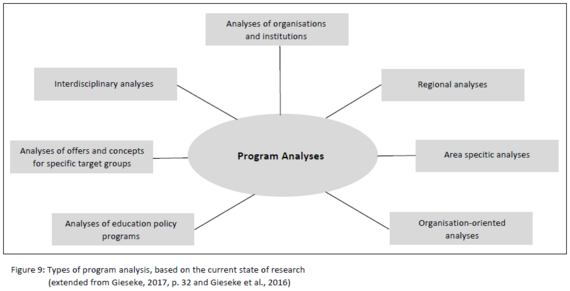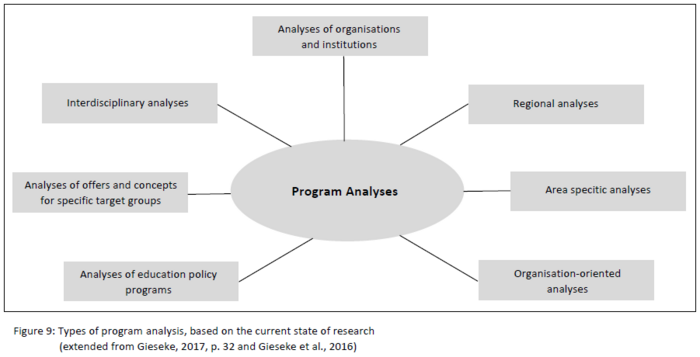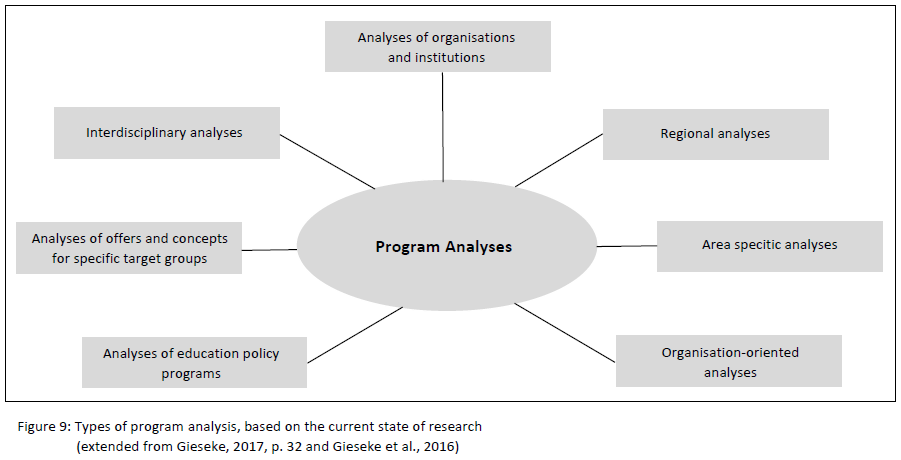What is a program in adult and continuing education?
"Programs in adult education/continuing education are published announcements of teaching and learning courses and other services (e.g. employee training or counselling). Their primary purpose is to provide information about current offers and/or to acquire clients; their secondary purpose is to present the institutions themselves and to legitimize their work. [...] The programs incorporate operationalized concepts about the educational needs and qualification requirements of potential participants and about forms of pedagogical mediation that providers have developed on the basis of experiences, explorations, but also on their own educational ideas and the requirements of funding bodies." (Nolda 2018, p. 433f.)
"Programs of continuing education institutions and organizations reflect the range of continuing education providers with their offers structured according to main topics. They provide information about the development of focal points in the offerings, they show relationships between the overall offering and individual program fields, shifts between the program areas or fields. They point to new focal points, make boundaries and new connections in the process of knowledge generation visible. But they also provide findings about the modeling approach of knowledge.” (Gieseke 2008, p. 67).
"Programs are texts that contain the current activities offered by a publicly funded institution, a commercial provider or a company. Such texts, which are available in form of printed brochures, flyers or advertisements or can be accessed on the Internet, are primarily intended to provide information for interested individuals who can decide on the offer on the basis of provided data. They are therefore short-term functional texts that no longer fulfill their actual purpose soon after their publication." (Nolda 2003, p. 212)
"The offer is a subcategory of the program. Without offers, which may be courses, projects or workshops, there would be no program. When many offerings are bundled into a program under one task, one function or one field of activity, this is referred to as a 'program segment' or 'program area'. The offer is based on the educational interests identified by the planner and is directed at potential addressees or target groups. It should respond to specific needs and requirements that can also be responded to by other offers in a main program area." (Gieseke 2018, p. 25)
“From a historical-educational point of view, the program represents the result of historical, social, economic and educational policy developments at a particular time. From this perspective, it is an expression of certain social processes that are given a place in the programs focal points in an interest-related way, i.e. depending on the organization, or are shaped in the organizations through educational policy regulations on project funding – while maintaining a relative autonomy.” (Gieseke 2018, p. 24)
What is a program analysis?
“The program analysis focuses on the specific aspect of adult education that is the 'program' and thus attempts to explore aspects of continuing education practice. Program analyses can be qualitative, quantitative, or a combination of methods. They are methodological approaches that are determined by the data type 'program' and make use of different procedures.” (Käpplinger 2008)
“Program analyses are systematic, empirical evaluations of programs, especially of program booklets. Program analysis is a method of adult and continuing education” (Käpplinger & Robak 2018, p. 67)



What does program research do?
“Program research evaluates programs from the distance of observers who subsequently make use of the texts or information contained in them in order to gain insights into the adult education programs offered by one or more providers or institutions; usually related to specific topics (areas) or types of knowledge, aims, target groups, organizational conditions and didactic arrangements (Schrader and Ioannidou 2009). As non-reactive, natural data, however, the texts also provide information about the planning actions of adult educators, which are of interest to the field of research on profession (Gieseke 2015, p. 171).” (Nolda 2018, p. 434f.)
“With program research, we are operating in a key area of modern research on further education, which engages with the process of change in the education sector through research rather than through normative arguments about education policy. Through this research, reality as a shaped reality encounters new educational policy intentions or stimulates educational policy initiatives. The importance in this context is that educational policy premises are not uncritically taken as a starting point. Adult education research results broaden the perspective and can provide important suggestions for the planning and design of programs if they are recognized by practical and political stakeholders. We can then view programs as an expression of concepts of pedagogical action, in which both conceptual considerations and demand-driven ideas are incorporated, since financing is not secured as it is in formal education and the participants are always considered as clients at the same time.” (Gieseke 2008, S. 67)
“Program research examines the result of program planning, the program. The development and analysis of programs is a key requirement of professionalism for practitioners and university graduates. An analysis can be used to examine how these requirements are met in practice.” (Käpplinger & Robak 2018, p. 65)
Further reading
Fleige, M., Gieseke, W., Hippel, A. v., Käpplinger, B. & Robak, S. (2018). Program and offer development in adult and further education (Adult and Further Education, Vol. 2). wbv.
Gieseke, W. (2008). Demand-oriented planning of adult education programs. Bielefeld: wbv
Gieseke, W. (2018). Program and offer. In Fleige, M., Gieseke, W., Hippel, A. v., Käpplinger, B. & Robak, S. (2018). Development of programs and offers in adult and further education (Adult and Further Education, Vol. 2). wbv. P.18-27.
Käpplinger, B. (2008). Program analyses and their significance for pedagogical research. In Forum: Qualitative Social Research, Vol.1, Art. 37 (29.05.2013)
Käpplinger, B. & Robak, S. (2018). Research with programs: orientation for student projects. In Fleige, M., Gieseke, W., Hippel, A. v., Käpplinger, B. & Robak, S. (2018). Development of programs and offers in adult and further education (Adult and Further Education, Vol. 2). wbv. P. 64-75.
Nolda, S. (2018): Program analysis in adult education/continuing education - methods and research. In: Tippelt, R. & Hippel, A. v. (eds.):Handbook of Adult Education/Continuing Education. Springer VS. P. 433-450.
Nolda, S. (2010): Dictionary article on programs.In Arnold, R., Nolda, S. & Nuissl, E. (Hrsg.).(2010). kreativhaus adult education. Bad Heilbrunn.
Nuissl, E., (2010). Trends in continuing education research (p. 173). In DIE (ed.), Trends in continuing education – DIE Trend Analysis 2010. Bielefeld.
